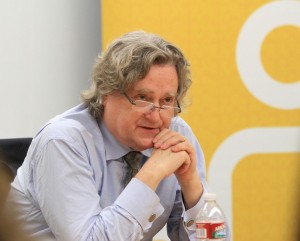British diplomat discusses culture, tradition
Though public diplomacy is a well-known phrase when it comes to international issues, Director of the British Council to the United States Paul Smith stressed his preference of the term “cultural relations” on Thursday at an event hosted by the USC Center on Public Diplomacy.
“To a degree, I would argue that [cultural relations] does differ quite significantly from public diplomacy,” Smith said. “The relationship really is about trying to engender trust between people who may not initially have reason to trust each other.”

Public diplomacy · Director of the British Council to the United States Paul Smith talked about culture to an audience of about 30 people. — Corey Marquetti | Daily Trojan
The importance of understanding other cultures remained the focus of Smith’s talk to an audience of about 30, many of whom were graduate students in the public diplomacy master’s program.
“Getting public diplomacy to happen is the challenge of our times,” Smith said.
To Smith, the use of the term “cultural relations” also better encompasses the efforts that he has been a part of throughout his career.
“Over the years, the British Council has moved towards using another phrase and that phrase we use is cultural relations,” Smith said. “We believe that all the work that we do comes from the umbrella of that phrase.”
Smith previously served on the British Council in Nigeria, Burma, Chile, Germany, Bangladesh, New Zealand, West India, Egypt and Afghanistan before coming to the United States last August as Director of British Council and Cultural Counsellor at the British Embassy in Washington D.C. In line with his experience, Smith emphasized the importance of all nations having diplomacy efforts.
“It is an essential attribute to most countries’ international foreign policy to have public diplomacy programs,” Smith said.
Smith likened nations to a “four-legged chair” rather than the traditional “three-legged stool,” explaining that the three traditional legs of governance, economics and security are not enough to support a nation.
“If it’s a three-legged chair, it’s going to fall over,” Smith said. “That fourth leg is culture.”
Lauren Allison, a first year masters student in public diplomacy, came to hear Smith because of his vast experience in the field of public diplomacy.
“I find it really fascinating,” Allison said. “It’s really great to have someone at USC who has insight and 30-plus years of experience in cultural diplomacy around the world.”
Kia Hays, a second-year student in the masters program on public diplomacy, said she enjoyed how Smith’s talk mirrored a lot of what she was learning in the classroom.
“I agreed very much with a lot of what he said,” Hays said. “It is nice to see a professional saying the same things we see in an academic setting.”
